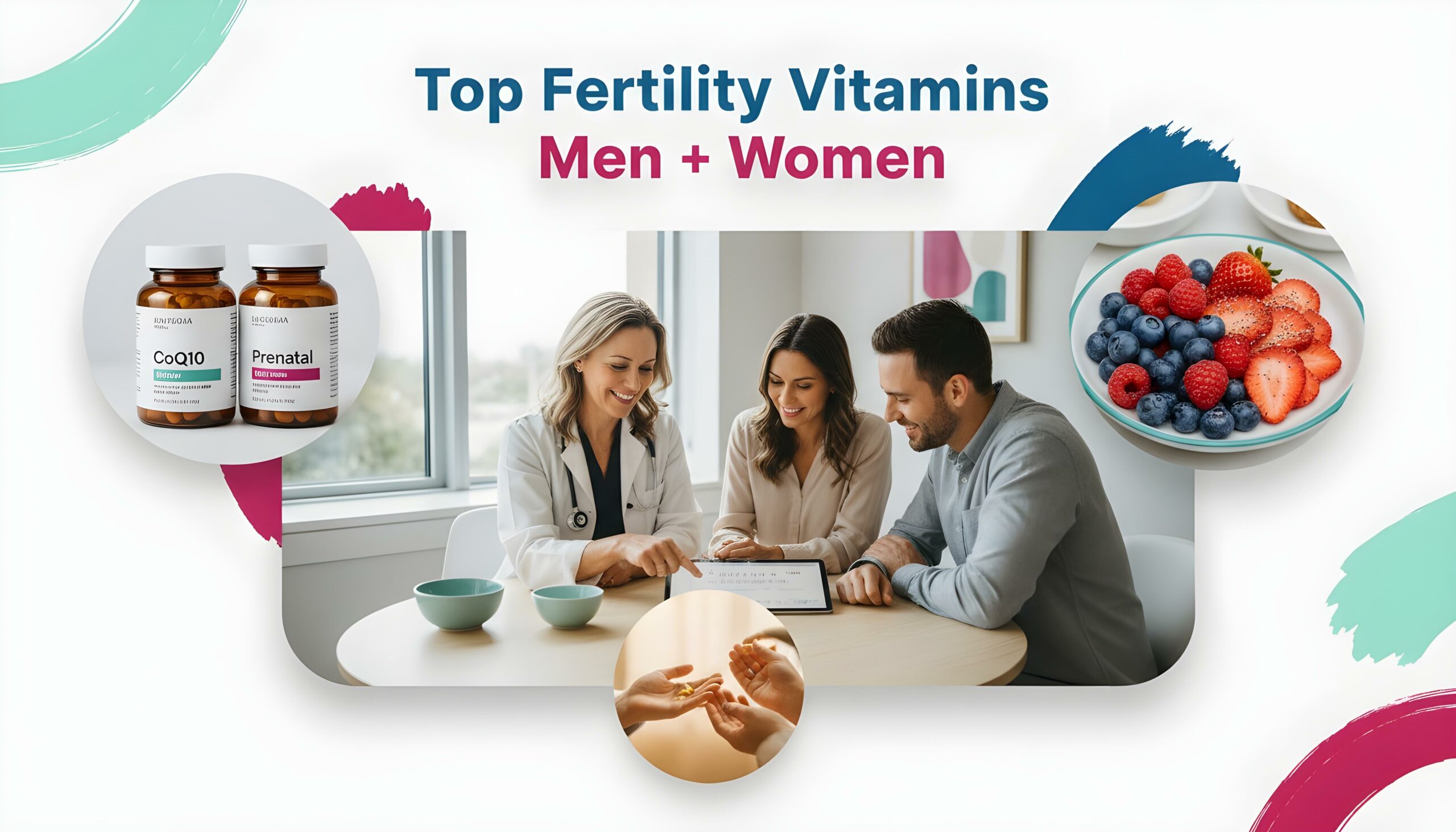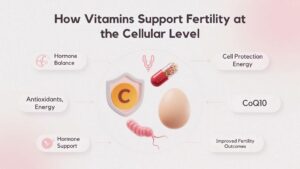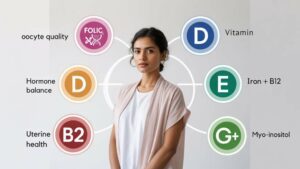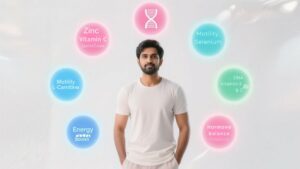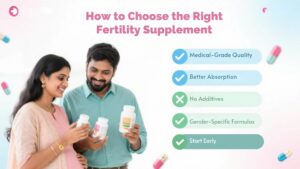Getting the best fertility vitamin for men and women shouldn’t be hard, especially if you’re already feeling down from trying to get pregnant. Taking the right mix of prenatal vitamins, CoQ10, folic acid, vitamin D, zinc, and omega-3 can help keep hormones in balance, keep eggs healthy, and help sperm move around.
Get a free appointment with Fertility World at +91 9311850412 or info@fertilityworld.in if you need help figuring out what YOU should do.
Introduction — Why Vitamins Matter for Fertility Health
Every couple who wants to have a kid knows that the road to motherhood may be emotional, exhilarating, and sometimes too much to handle. Many people don’t know that the journey really starts within your body, long before you get pregnant. It starts with how well you take care of yourself. To make life, your body needs care, patience, and the correct nourishment. Fertility vitamins for men and women do more than just “boost fertility.” They also help balance hormones, make eggs and sperm healthier, and get your body ready to care for something lovely.
But let’s be honest: it’s not always simple to do that in today’s world. Stress, not eating regular meals, and diets low in nutrients can all have a negative effect on your reproductive health. That’s where fertility pills come in. They gently fill in the gaps and give your body the extra help it needs to do what it was always designed to do: make life with love and balance.
Understanding the Role of Vitamins in Fertility
When you’re trying to get pregnant, it’s easy to worry about tests and time, but your body needs food first. This is where drugs and getting pregnant meet. There are tiny nutrients that work in the background to keep your hormones in check, your reproductive cells healthy, and your body ready to give birth.
Modern diets and worry can make it hard to get enough of some micronutrients that are needed to get pregnant, even if you eat well. As the natural support system that keeps everything running smoothly, vitamins are like “fertility fuel” for your body.
How Vitamins Affect Reproductive Hormones
Hormones play the parts of an orchestra that is your body. Everything must stay in tune for the music to work well. And that’s exactly what vitamins do: they help your body keep its hormones in balance. Here’s a step-by-step look at how vitamins affect fertility:
- Vitamin D helps with pregnancy and improves the health of the ovaries.
- Vitamin B12 helps keep hormones in check and stops cycles from going off track.
- Zinc is very important for making sperm and eggs.
- Vitamin E makes it easier for blood to get to the sexual organs.
- Iron supports healthy ovulation and keeps you from getting anaemia.
When you get enough of these nutrients, your hormones sort out on their own. This makes your eggs and sperm healthier and gives you more energy to get pregnant. That means normal ovulation and a healthier lining of the uterus for women. It means that men’s sperm will be bigger and move faster.
It’s not magic; you’re just giving your body what it needs to do its job.
The Link Between Antioxidants
Here’s another secret: your eggs and sperm are always fighting off free radicals, which are tiny chemicals that hurt DNA and cells.
- Antioxidant vitamins also protect your body naturally in this way.
- Vitamin C protects sperm from harm.
- Follicle cells and the walls of the uterus stay healthy with vitamin E.
- Especially as you get older, CoQ10 gives both eggs and sperm energy.
These powerful nutrients are more than just vitamins; they’re giving your unborn child the best start possible.
Best Fertility Vitamins for Women
You need to have proper nutrition to make your body ready for pregnancy. Your reproductive system is like a garden: it needs food, water, sunshine, and care so that something beautiful can grow. These fertility vitamins for women quietly work behind the scenes to improve the quality of eggs, keep hormones in balance, and set up a healthy environment for getting pregnant.
These are the best fertility products for women that will really help your body get pregnant, whether you’re trying to get pregnant naturally, dealing with PCOS, or getting ready for IVF.
1. Folic Acid (Vitamin B9)
Folic acid is sometimes called the “egg starter.” It helps your body make strong, healthy eggs and is necessary for good DNA. It helps early pregnancy and lowers the risk of miscarriage and birth problems, which is why it’s important.
How much: 400–800 µg a day, or 1 mg if you’re over 30 or planning IVF.
Leafy veggies, lentils, citrus fruits, and beans are all natural sources.
Keep folic acid in mind as a must-have before you get pregnant. It is one of the most important vitamins for egg quality and early development.
2. Vitamin D
You may need more Vitamin D if your periods aren’t regular or if your mood changes. It’s one of the best vitamins for female fertility because it helps your body control reproductive hormones and make eggs mature properly.
Why it’s important: Women whose Vitamin D levels are normal are more likely to get pregnant or have an IVF success.
A test showed that 1000 to 2000 IU should be taken every day.
Sunlight, milk with added vitamins, salmon, and egg whites are all good sources.
Tip: You can spend 10 to 15 minutes a day in the sun. It gives Natural vitamin D, which can help you get pregnant.
3. Coenzyme Q10 (CoQ10)
CoQ10 helps our eggs keep some of their natural energy as we age. Cells stay healthy and repair themselves, especially after age 30. It raises the quality of the eggs and improves the chances of fertilisation, especially if you are using IVF or have low AMH.
- In what amounts: 200 to 600 mg every day.
- Recommended for women over 35 or getting ready for IVF.
- Tip: CoQ10 is often called the “spark plug” of fertility because it helps your eggs reproduce properly.
4. Vitamin E
The vitamin E in your body protects the cells in your uterus and reproductive system from harm.
Reasons for importance: It raises blood flow to the uterus and helps the egg stick.
Ingredients: olive oil, avocados, sunflower seeds, and almonds. For extra antioxidant defence, take Vitamin E with CoQ10.
5. Iron and Vitamin B12
Feeling tired, lacking energy, or having cycles that don’t follow a pattern? Your routine might be missing these two.
Best Sources for Nutrients: Why It Matters
| Nutrient | Why It Matters | Best Sources |
|---|---|---|
| Iron | Helps deliver oxygen to your ovaries and uterus | Spinach, lentils, tofu |
| Vitamin B12 | Supports healthy hormone levels and energy | Eggs, poultry, fortified cereals |
Advice: Iron and B12 aren’t given enough credit, but even a healthy cycle can go off track without them.
6. Omega-3 Fatty Acids (EPA/DHA)
Omega-3s help cool down inflammation, which can have a quiet effect on fertility. They also help your eggs and uterus get more blood, which makes implantation easier.
- Why it’s important: It makes egg membranes better and helps keep hormones in order.
- Fish, nuts, chia seeds, and flaxseed oil are all good sources.
If you don’t eat much fish, try an Omega-3 vitamin made from plants. It’s one of the easiest natural ways to make you more fertile.
7. Myo-Inositol
Myo-Inositol can make a big difference if you have PCOS or cycles that don’t go as planned. It helps your body use insulin correctly and keeps your periods regular.
- Why it matters: It helps eggs grow in a healthy way and keeps hormones in order.
- How much: 2000–4000 mg every day.
- Fruits and beans are the best places to get it, but most people take it as a supplement.
Tip: Many doctors say to take Myo-Inositol with folic acid. They work well together to keep hormones in balance.
Best Fertility Vitamins for Men
It’s not just women who have problems getting pregnant; guys also have that problem. Actually, almost half of all problems with pregnancy are caused by men. You know the good news? Semen health can get better on its own in just a few months if men take the right vitamins and live a healthier lifestyle.
Whether you’re trying to get pregnant spontaneously or getting ready for IVF, these key sperm health supplements can help increase the number of sperm, make them move better, and increase your chances of conceiving.
1. Zinc
For good sperm formation and testosterone production, zinc is important.
Understanding: It raises the number of sperm and makes them move faster.
Apples, oysters, red meat, and beans are the best places to get it. Low zinc levels mean poor sperm quality. Eating a handful of pumpkin seeds every day can help.
2. Vitamin C
A necessary antioxidant that keeps sperm from getting hurt.
- Reasons for importance: It lowers DNA breakage and raises cell movement.
- 500–1000 mg per day is the recommended dose.
- Citrus fruits, strawberries, and kiwis are reliable sources. Vitamin C is like armour for your sperm.
3. Selenium
It helps sperm tails stay healthy, which is what makes sperm move.
- Why it’s important: It makes sperm move and look better.
- Sources: Nuts from Brazil, eggs, and fish
- Two Brazil nuts a day are very good for you.
4. Coenzyme Q10 (CoQ10)
It gives sperm the power to move quickly.
- Why it matters: It makes sperm move more easily and increases the chance of fertilisation.
- Men over 30 or with a low sperm count should use this.
- Plus, CoQ10 is good for both men and women because it improves the health of both eggs and sperm.
5. L-Carnitine
Gives sperm cells energy to help them move better.
- Why it’s important: It makes more sperm and makes them move faster.
- 1000–2000 mg per day is the recommended dose.
- Lean meat, cheese, and avocados are good sources.
6. Vitamin E & D Combo
It takes all of these to keep testosterone levels in check and protect sperm cells.
Vitamin D can be found in almonds, sunflower seeds, salmon, and sunshine. Men who get enough vitamin D have stronger sperm and more testosterone.
7. Folic Acid + Zinc Combo
A mixture that has been shown to improve the quality of sperm and DNA.
Why it matters: It improves the chances of fertilisation in both IVF and spontaneous birth. Eggs, veggies, seeds, and whole grains are good sources.
Vitamins That Work Best When Taken Together (Synergistic Nutrient Pairs)
You can get more out of some vitamins when you take them together. This natural vitamin combination for fertility helps your body receive nutrients better and improves the quality of both eggs and sperm. You can think of them as “power pairs”—little nutrients that work together to make the best fertility vitamins for women and men.
Here are some of the best fertility supplement combinations that work:
| Combination | Why It Works |
|---|---|
| Folic Acid + B12 | Strengthens egg DNA and supports healthy cell growth. |
| CoQ10 + Vitamin E | Double antioxidant power for better egg and sperm protection. |
| Vitamin D + Omega-3 | Balances hormones and improves implantation chances. |
| Zinc + Selenium | Enhances sperm motility and testosterone production. |
| Inositol + Magnesium | Supports hormone balance and ovarian health (especially for PCOS). |
How to Choose the Right Fertility Supplement
Due to the large number of choices, picking the best fertility supplements can be hard. What’s more, not all vitamins are created equal. Your body should be able to easily take the right fertility multivitamin, and it should also be safe. Here is an easy list to help you make a knowledgeable choice:
- For medical-grade quality, always choose supplements that have been tried by a third party to make sure they are safe and pure.
- For better absorption, choose bioavailable forms like chelated minerals or methylfolate instead of normal folic acid.
- No extras—Avoid vitamins that have artificial colours, sweeteners, or fillers that aren’t needed.
- Choose formulas made for your gender. For example, men need zinc for reproduction, and women need folate.
- Before starting IVF or trying to get pregnant, both parties should take fertility supplements for at least three months.
How Long to Take Fertility Vitamins Before Pregnancy
Here’s the truth about how long you should take fertility vitamins before trying to get pregnant: your body needs time to get ready. Sperm and eggs don’t grow up quickly; it takes them about 90 days to become fully grown. This is why being consistent is so important. The vitamins and minerals you eat today will help the eggs and sperm you release in three months.
| Time Frame | Focus | Goal |
|---|---|---|
| 0–3 Months | Detox & antioxidant build-up | Improve egg and sperm health |
| 3–6 Months | Hormone balance | Support natural conception |
| During IVF | Egg & sperm maturation | Enhance embryo quality |
| Pregnancy | Prenatal vitamin support | Prevent complications & nourish baby |
It’s like giving your body a gentle “fertility reset” by letting it clean itself, replenish, and get stronger for a few months before you get pregnant or do IVF. If you need help, here is a simple schedule for preconception supplements:
Tip: Do not wait until you are “all set to try.” Start taking vitamins at least three months before IVF or conception. This will give your body the nutrients it needs to have the best possible start.
Common Myths About Fertility Vitamins
Let’s be honest: the world of fertility advice may be very confusing. You read one thing on Google, hear another from a buddy, and by the end of the day, you’re just staring at a stack of supplement bottles and wondering, “Do these even work?“
Let’s get things straight by debunking some myths in a real conversation.
Myth 1: “Fertility vitamins guarantee pregnancy.”
Nope, not even close!
Vitamins are not a magic wand; they are like a support squad for your body. They don’t ensure that you will get pregnant, but they do help make the appropriate conditions for it. What is the truth? Fertility vitamins help your hormones, the quality of your eggs and sperm, and your general reproductive health. However, medical treatment and timing are still important.
So, no, they aren’t miraculous medications… but they are undoubtedly good for your body.
Myth 2: “A regular multivitamin is all you need.”
Not really.
A basic multivitamin is like a generalist because it does a little bit of everything. However, fertility supplements are experts. They’re full of nutrients, including folate (B9), CoQ10, vitamin D, and antioxidants that are good for the health of eggs and sperm.
In short, your everyday multivitamin is wonderful, but your fertility vitamin is the best.
Myth 3: “Supplements are only for women.”
This one is old. Fertility is a team sport! About 50% of infertility cases involve male factors — and yes, men need nutrients too. Zinc, selenium, CoQ10, and vitamin C can all help improve the quality, number, and movement of sperm.
So, guys, if she’s taking her vitamins every day, don’t just cheer her on. Get your own bottle and join the fertility.
Final Thoughts
You can start making a baby before the first beating even happens. Take care of yourself today. No matter if you’re a man or a woman, the right fertility vitamins will help your body feel healthy, energised, and ready for whatever comes next.
Beyond science, it’s love for oneself. You can tell your body, “I’m getting ready for something important” with every capsule, meal, and careful choice. Carefully feeding yourself is like taking care of the life you want.
Book your Nutrition & Fertility Consultation at Fertility World, which can help your body and your hope grow.
Disclaimer: The information in this article is only meant to teach. It is not meant to be used instead of professional medical advice, diagnosis, or treatment. Before taking any supplements or making big changes to your diet, you should always talk to your doctor or another skilled health care provider.
What are the best vitamins for male fertility?
Zinc, Selenium, Vitamin C, CoQ10, and L-Carnitine are some of the most important vitamins for men's reproductive health. They help make more sperm, make them move better, and keep the DNA in the sperm from getting damaged.
How long should I take fertility supplements before IVF?
It's best to take fertility medications for at least three months before IVF. Eggs and sperm both take about 90 days to become fully grown. During this time, taking vitamins on a daily basis can improve the quality of your eggs and sperm, which can lead to better IVF results.
Can too many vitamins affect fertility?
Yes, it is possible to get sick from taking too many vitamins or very high amounts. Having more isn't always better. For instance, too much vitamin A or E can throw off hormones. Always take the daily dose that is suggested, or talk to a fertility expert before starting to take supplements.
What vitamins increase sperm motility?
Men should take Zinc, Selenium, CoQ10, L-Carnitine, and Vitamin C to help their sperm move and give them more energy. The chances of getting pregnant naturally or through IVF are better when these vitamins help the sperm move better and get to the egg.

